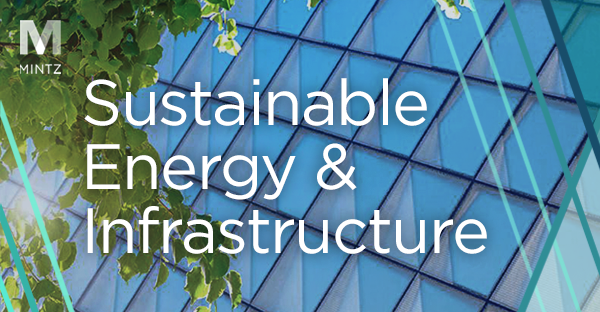Energy & Sustainability Legal Feature — Massachusetts Approves $4B 2022–2024 Efficiency Plan
The Massachusetts Department of Public Utilities (“DPU”) approved the 2022–2024 Three-Year Energy Efficiency Plan (the “2022–2024 Plan”), which allocates $4 billion in energy efficiency incentives. The 2022–2024 Plan restructures Mass Save to align with the state’s climate goals and ensures that the funds are used to maximize customer benefits and savings.
What is Mass Save?
Established in 2008, Mass Save is an initiative that provides a range of energy efficiency services to help the Commonwealth achieve its climate goals. The program’s funding comes from Massachusetts residents who all pay an energy efficiency fee on gas and electric bills. In partnership with the Massachusetts Department of Energy Resources and large energy suppliers in the state, Mass Save provides no-cost home energy assessments, advice to reduce energy usage, rebates, and other incentives.[1] As a result, Massachusetts residents are able to better manage their energy use and utility costs.
Currently, residents in Massachusetts who are customers of Berkshire Gas, Cape Light Compact, Eversource, Liberty Utilities, National Grid, or Unitil are eligible for savings under the 2022–2024 Plan.[2] The amount of services offered is based on level of income. The plan identifies low-income customers as those who earn less than 60% of the state median income and moderate-income residents as those who make between 60% and 80% of the state median income. Based on the income level, services can be provided up to 100%. For example, the program offers a 100% weatherization incentive for low- and moderate-income customers.[3]
How does the 2022–2024 Plan change things?
The 2022–2024 Plan restructures Mass Save through revamped rebates, zero-cost efficiency upgrades, interest-free loans, and other additional energy efficiency incentives.[4]
The plan’s weatherization rebates are a significant update to Mass Save incentives and reaffirm the state’s commitment to decarbonization. As demonstrated earlier this year with the launch of the Commission on Clean Heat, the Commonwealth aims to decarbonize residential and commercial buildings by updating buildings with electric heating systems. In order to switch to electric heating pumps, HVAC contractors recommend homes undergo weatherization first to cut costs and decrease energy use.[5] The plan’s new 100% rebate on weatherization for low and moderate-income households provides a cost-effective starting point for homeowners.
In addition to weatherization, the plan will use its budget to offer further electric heat pump incentives while setting strict reductions for annual oil, propane, and natural gas use. Homeowners who choose an electric heat pump system can receive up to a $10,000 rebate.[6] More Massachusetts residents can make the switch, as Program Administrators, entities that run Massachusetts energy efficiency programs, aim to launch a heat pump education campaign and a page dedicated to heat pumps on the Mass Save website. They will also create a heating calculator so that customers can better understand their energy usage.[7]
Impact on Massachusetts Communities
Many stakeholders applaud the 2022–2024 Plan, however, the plan’s impact on Massachusetts communities, specifically environmental justice (“EJ”) communities, will be difficult to quantify. The 2022–2024 Plan focuses on workforce expansion and sets specific equity targets to address underserved populations. Nevertheless, many EJ community experts believe that these measures are a good start but not enough as the DPU rejected recommendations to track demographic data based on age, race, ethnicity, and other factors.[8] Demographic data is essential for policymakers to identify and keep up with changes in community needs, disparities, biases, and cultural preferences.[9] In addition, this demographic data could promote an efficient use of resources. Despite the program’s limitations, the 2022–2024 Plan and its transformation of Mass Save is a necessary step towards energy efficiency progress in the Commonwealth.
1 https://www.masssave.com/
2 https://www.bostonglobe.com/2022/02/02/science/what-new-mass-save-rewrite-means-you/
3 https://www.masssave.com/en/saving/income-based-offers/income-eligible-programs
4 https://www.mass.gov/news/dpu-approves-massachusetts-nation-leading-three-year-energy-efficiency-plan
5 https://www.mass.gov/news/dpu-approves-massachusetts-nation-leading-three-year-energy-efficiency-plan
6 https://www.bostonglobe.com/2022/02/02/science/what-new-mass-save-rewrite-means-you/
7 https://www.mass.gov/news/dpu-approves-massachusetts-nation-leading-three-year-energy-efficiency-plan
8 https://www.utilitydive.com/news/massachusetts-approves-4b-efficiency-plan-is-it-transformational-or-a/618313/
9 https://www.mass.gov/lists/making-clas-happen-six-areas-for-action
Authors

Kati P. Strzelczyk

Shaina Sikka
She holds a BA, magna cum laude, from Boston University.

